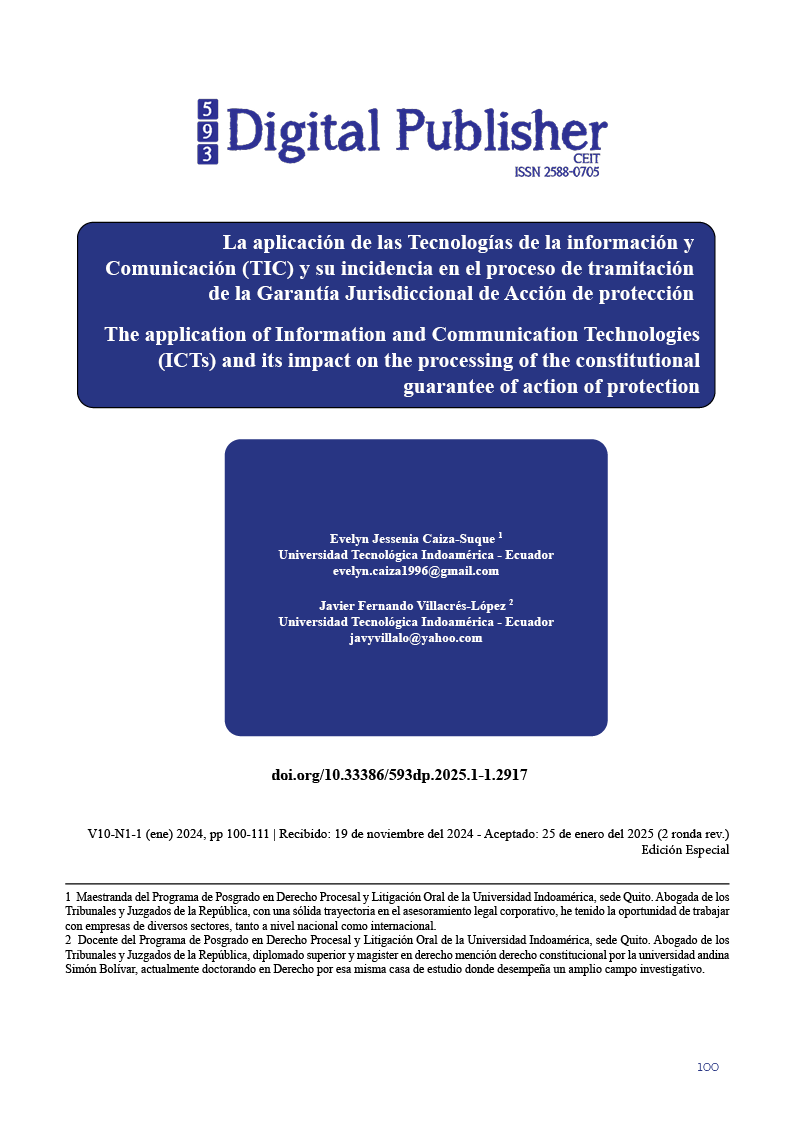The application of Information and Communication Technologies (ICTs) and its impact on the processing of the constitutional guarantee of action of protection
Main Article Content
Abstract
This article addresses the question: How do Information and Communication Technologies (ICTs) impact the processing of the constitutional guarantee of action of protection? To answer this, it is necessary to analyze the impact of ICTs on improving the processing of the action of protection as a jurisdictional guarantee in Ecuador. Therefore, each element is expanded, mainly the background and references of ICTs and their development up to the present, delving into their use in the administration of justice, their benefits and limitations, as well as the projection of their permanent application in jurisdictional guarantees to safeguard and evolve effective judicial protection in practice. It is concluded that, although the inclusion of ICTs represents a step to-wards more accessible and efficient justice, it is crucial to address the existing challenges to en-sure that the modernization of the judicial system does not compromise the rights and freedoms of citizens.
Downloads
Article Details

This work is licensed under a Creative Commons Attribution-NonCommercial-ShareAlike 4.0 International License.
1. Derechos de autor
Las obras que se publican en 593 Digital Publisher CEIT están sujetas a los siguientes términos:
1.1. 593 Digital Publisher CEIT, conserva los derechos patrimoniales (copyright) de las obras publicadas, favorece y permite la reutilización de las mismas bajo la licencia Licencia Creative Commons 4.0 de Reconocimiento-NoComercial-CompartirIgual 4.0, por lo cual se pueden copiar, usar, difundir, transmitir y exponer públicamente, siempre que:
1.1.a. Se cite la autoría y fuente original de su publicación (revista, editorial, URL).
1.1.b. No se usen para fines comerciales u onerosos.
1.1.c. Se mencione la existencia y especificaciones de esta licencia de uso.
References
Asamblea Nacional. (2008). Constitución de la República del Ecuador. Registro Oficial 449 de 20 de octubre del 2008
Congreso de la República de Colombia. (2019). Ley 1978 de 2019. Recuperado de https://www.secretariasenado.gov.co/senado/basedoc/ley_1978_2019.html
Corporación Administrativa del Poder Judicial. (2024, 10 de julio). ¿Qué es CAPJ? Extraído de: https://www.pjud.cl/post/que-es-capj
Corte Constitucional de Colombia. (2010). Sentencia T-291 de 2010. Recuperado de https://www.corteconstitucional.gov.co/relatoria/2010/T-291-10.htm
Departamento Nacional de Planeación. (2024, 13 d julio). Plan Nacional de Desarrollo 2022- 2026. Extraído de: https://www.dnp.gov.co/plan-nacional-desarrollo/pnd-2022-2026
Fernández, R. (2023). Seguridad y privacidad en la era digital: Retos para el sistema judicial. Editorial Jurídica.
González, M. (2020). La digitalización en la administración de justicia: Transformaciones y desafíos. Revista de Derecho y Tecnología, 12(3), 40-55.
Guevara, J. & Ríos, C. (2020). Implementación de las tecnologías de la información y la comunicación en los consultorios jurídicos en Colombia. Revista Chilena de Derecho y Tecnología, Vol. 9 Núm. 2
Martínez, A. (2021). Plataformas electrónicas y su impacto en la tramitación de casos constitucionales. Journal of Legal Innovation, 18(2), 72-85.
Ministerio de Tecnologías de la Información y Comunicación de Colombia. (2024, 15 de julio). Acerca del MinTic. Extraído de: https://www.mintic.gov.co/portal/inicio/Ministerio/Acerca-del-MinTIC/
Pérez, J., & López, C. (2022). Inteligencia artificial en el análisis de casos constitucionales: Oportunidades y riesgos. TechLaw Review, 9(1), 105-120.
Sacoto, M. & Cordero, J. (2021). E-justicia en Ecuador: inclusión de las TIC en la administración de justicia. Foro: Revista de Derecho
Storini, C. & Guerra, M. (2018). La justicia constitucional en el Ecuador y su desarrollo desde la vigencia de la Constitución de Montecristi. Revista IURIS, No. 17
Romo, M. C. S., & Moscoso, J. M. C. (2021). E-justicia en Ecuador: Inclusión de las TIC en la administración de justicia. Foro: Revista de Derecho, 36, Article 36. https://doi.org/10.32719/26312484.2021.36.5



